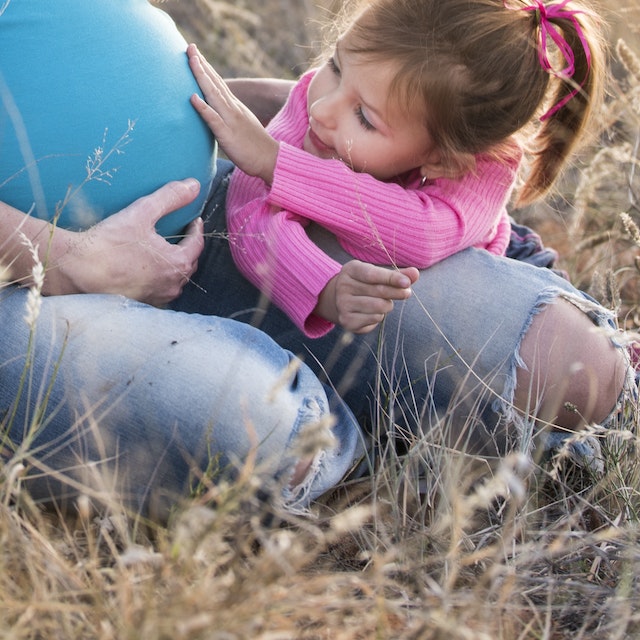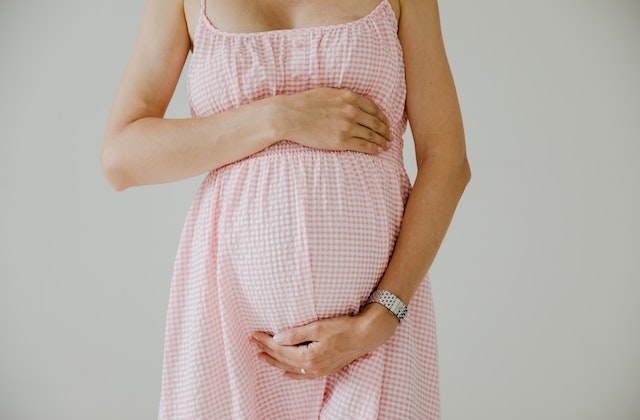
Can babies sense pregnancy before you know it? – There have been numerous anecdotes and tales about babies and toddlers displaying a seemingly mysterious ability to sense their mother’s pregnancy, even before she is aware of it. The experience of pregnancy can be filled with anxiety and uncertainty, making it one of the most transformative journeys for a woman.
During pregnancy, changes such as bloating of the stomach, fuller and tender breasts, and the renowned “pregnancy glow” can become apparent, signaling the presence of a baby growing inside. However, the question arises: do babies with limited developmental abilities truly possess the power to sense their mother’s pregnancy, or are these simply old wives’ tales?
In this article, we will delve into the science and myths surrounding babies’ alleged ability to sense pregnancy. We will explore the possible reasons behind such claims and examine whether there is any factual basis to support them. By shedding light on this intriguing topic, we aim to provide a comprehensive understanding of the fascinating connection between babies and their mothers during the transformative journey of pregnancy.
Can Babies Sense Pregnancy Before You Know It?

There is no scientific evidence to support the claim that babies can sense pregnancy before a mother. Some people believe that babies in the womb can communicate with toddlers. Also, toddlers can hear the developing baby inside the womb. Parents become attuned to their behaviors as they spend time caring for their children. They may also interpret certain signs as indications of their child sensing a pregnancy.
Parents often notice changes in their toddlers’ behavior, such as increased clinginess or neediness, even when their child is directly expressing that the mother is pregnant. While it is heartwarming to entertain the idea that a baby can intuitively sense a pregnancy, the truth is that this remains a myth without scientific validation. It is important to approach these stories with an open mind while also relying on established scientific knowledge and understanding.
Why Do Mothers Believe Their Babies Can Sense Pregnancy
Some mothers notice changes in their toddler’s behavior when they get pregnant. This may make it seem like babies can sense their mother’s pregnancy.
- Your baby becomes clingy and needy: Many expectant mothers could confirm that their child became extra clingy out of the blue. Some mothers report their babies being obsessed with patting and rubbing their mother’s tummy
- Your baby starts to act up: Without you explaining to them what is going on, children may have full-blown-out tantrums or meltdowns. They may wake up screaming and even reject their mothers.
- Kissing and talking to your baby bump: Even though your baby bump has not begun to show, mothers report their babies kissing and talking fondly to their stomachs.
These are some of the actions that make mothers believe that babies can sense their mother’s pregnancy.
Some Myths Explained
1. Clinginess and being needy
It is important to acknowledge that extra clinginess and neediness are common behaviors in children. This can occur for various reasons unrelated to sensing pregnancy. For instance, toddlers may experience stranger anxiety when faced with new caregivers or adjustments to their routines. Changes like returning to work can trigger a need for increased attention and attachment to their primary caregivers.
Additionally, environmental changes like moving to a new house or starting a new school can contribute to clinginess. Children tend to seek reassurance and familiarity. Separation anxiety may also arise when there are disruptions to their routine. Such as a parent attending doctor’s appointments or feeling unwell.
It is natural for parents to wonder if these behaviors are connected to a pregnancy. it is also important to consider alternative explanations rooted in developmental stages and environmental factors. Consulting with healthcare professionals can provide valuable insights and guidance in understanding and addressing your child’s needs.
2. Baby acting up
In addition to separation anxiety, it’s important to consider other factors that can contribute to a child’s behavior. This can be hunger, fatigue, bullying, and school-related stress. When a child’s emotional needs are not being met, it can lead to misbehavior.
It is tempting to attribute changes in your child’s behavior to your pregnancy. There is also a need to recognize that there is no concrete evidence to prove a direct connection. It is possible that the timing is coincidental, and various factors unrelated to pregnancy may be influencing your child’s actions.
To better understand and address your child’s behavior, it is important to communicate openly with them. You should also listen to their concerns, and consider consulting with professionals, such as teachers or child psychologists. They can provide insights and guidance based on their expertise. Focus on meeting your child’s emotional needs and addressing any underlying issues. With that, you can support their well-being and foster a positive parent-child relationship.
3. Kissing and talking to your bump
Do not be surprised when your child notices the changes in your body, especially the baby bump. Children can be very intelligent and inquisitive, this might prompt them to start talking to your bump.
There are tales and evidence that suggest this, but aside from acting out, clinginess, kissing, and talking to your bump, your child sensing pregnancy might just be a lucky guess because of the changes happening around them.
4. Toddlers hear things
Toddlers can be oddly perceptive, more than we give them credit for. Their little ears pick up things, even things they should not hear like you and your partner talking about conceiving a baby.
They may not have sensed a baby in your womb but may just be acting according to what they have heard.
5. Babies detect stress
Babies are very in tune with their mothers, and they can detect a slight change in their mother’s behavior. Many expectant mothers are more anxious and jittery. The hormonal changes will make them irritable, tired, and moody.
This cloudy demeanor has a way of inducing the toddler, making them display behavioral changes like acting up, throwing tantrums, having a little or low appetite, and reducing sleep.
6. Babies notice a change
When you are pregnant, a lot of things, including your baby’s routine, will change and you might not be able to do the things you would normally do with your toddler.
If you suffer from morning sickness, your child will notice you dashing to the toilet or being unable to eat. This is a new experience to them and toddlers are not fully developed to adapt to change.
Unconsciously, your attention shifts from your toddler to the new changes and how to cope with a newborn. They may not understand the new developments happening around them, but they might sense that something is up.
Why Your Baby Can Not Sense Pregnancy

Yes, some mothers swear that their babies can detect pregnancy, but science has not proven why things like that happen;
Your baby is delivered with the five senses (sight, hearing, smell, taste, and touch) and these senses have not yet fully developed. Toddlers have limited abilities to take on the world around them so they are not equipped to sense whether or not their mother is pregnant
The five senses are still under development. Toddlers may be responding to their mother’s mood swings rather than the pregnancy itself.
When To Tell Your Toddler You’re Expecting
Having a conversation with your toddler about the arrival of their sibling is essential, regardless of whether they are aware of your pregnancy. The timing of when to share this news is a personal decision for you and your partner.
Experts often recommend waiting until the end of the first trimester or when the baby bump becomes visible. At this stage, it becomes easier to explain to your toddler what is happening as they can visually see the changes in your body.
However, some parents choose to inform their children during the early stages of pregnancy, as it allows for early acceptance. By introducing the idea of a new sibling earlier, the child has more time to adjust and become familiar with the concept before the baby’s arrival.
Ultimately, the timing of when to talk to your toddler about the upcoming sibling depends on your circumstances and what feels right for your family. The key is to approach the conversation with openness, patience, and reassurance, ensuring that your child feels loved and included in this exciting new chapter of your family’s life.
There are a few things to consider when telling your kids about your pregnancy.
- The age of your kid determines their level of understanding.
- If this is their first sibling.
- Are there any other major changes happening in their lives?
Children react differently to pregnancies; some mothers suspect that their child’s odd behavior means they can sense pregnancy.
When informed about their mother’s pregnancy, toddlers react in different ways; some get clingy, some get aggressive and others get frustrated. Older children find it difficult to process such news so they might go through emotions such as jealousy, insecurity, and confusion.
All these different behaviors are common in children who just found out they are expecting a new sibling and children struggle with dealing with their emotions so, it is important to approach the matter delicately when telling your child.
While they may be young, you must talk with them and help them understand what is going on.
Also, Baby Center talks more about When and how to tell your three-year-old you’re pregnant.
How To Deal With A Clingy Toddler

After learning about the impending arrival of a new baby, it is not uncommon for toddlers to become clingy. This is because the focus and attention of the family shift towards the baby preparations, including buying new baby gear and the excitement surrounding the expectant mother’s growing belly. While there is no intention to neglect the toddler, they may perceive it that way.
Toddlers may exhibit regressive behavior, desiring to be carried and treated like a baby once again. This can be challenging for heavily pregnant women, particularly if their toddler has never displayed such behavior before. It is important to understand that toddlers are in a transitional phase, torn between wanting to assert their independence as big kids while simultaneously feeling hesitant to let go of the baby role they once occupied. Though it may seem like nothing significant has occurred, for your toddler, this change carries great weight in their world.
Furthermore
The clingy behavior will over time go away on its own, but you can also do things that will help improve your baby’s attitude.
- Try to be patient and understanding with them.
- Do not keep the baby a mystery. Talking to your toddler early enough will result in a positive reception of the baby
- Be honest and explain the realities of having a new baby in the home. Explain that a baby is a real person with its own needs and interests. Help them understand that a lot of things they need would have to be done for the new baby.
- Encourage them to get excited about their new sibling. Encourage friendships with your babies. Also, speak openly about how cool it is to have a baby brother and sister as best friends for life.
- Always answer questions that they may have.
- Create a little helper: let your older child do things for the baby, let them help with picking up the baby’s toys, helping you feed the baby, bathing, and dressing the baby up. Helping around the house will make them feel important. If they are not interested in helping out, do not force it.
- Reassure them that you love them by your actions.
Finally,
While there is no concrete scientific evidence to support the claim that toddlers can sense pregnancies, the abundance of stories and anecdotes surrounding this topic cannot be easily dismissed. The intriguing instances of toddlers asking unexpected questions or displaying peculiar behavior that led to the discovery of a pregnancy may leave us wondering. However, it is essential to recognize that the lack of scientific evidence suggests that these claims may not be grounded in objective reality.
Babies are indeed known to possess a heightened level of empathy and sensitivity, allowing them to respond to various triggers. Yet, it is important to approach these stories with caution, as they may simply be coincidences, and it can be easy to misinterpret a toddler’s odd behavior.
While the baby may not have a conscious understanding of pregnancy, they may still perceive that something is different or changing in their mother’s body and emotions. Babies are remarkably perceptive, and their intuition may play a role in their reactions.
Although it is difficult to downplay a toddler’s intuition, it is crucial to maintain a rational perspective and consider alternative explanations for their observations. While children’s predictions have been known to come true in the past, attributing it solely to their ability to sense pregnancies may oversimplify the complexities involved.
In conclusion, while there is a wealth of stories suggesting that toddlers can sense pregnancies, it is important to approach these claims with a critical mindset. While babies possess unique qualities and sensitivities, including a keen intuition, further scientific research is needed to fully understand and validate these claims.
Leave a Reply
You must be logged in to post a comment.